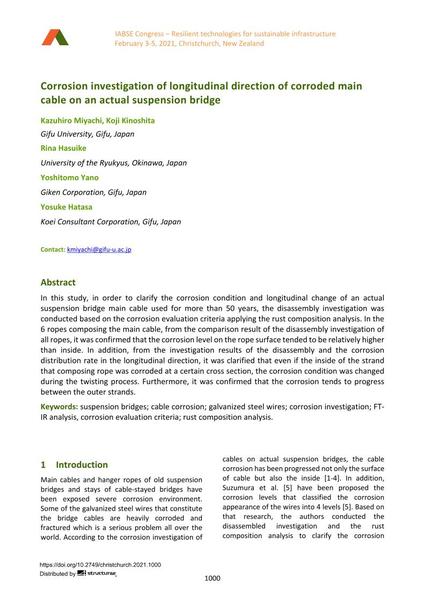Corrosion investigation of longitudinal direction of corroded main cable on an actual suspension bridge

|
|
|||||||||||
Bibliographic Details
| Author(s): |
Kazuhiro Miyachi
Koji Kinoshita (Gifu University, Gifu, Japan) Rina Hasuike (University of the Ryukyus, Okinawa, Japan) Yoshitomo Yano (Giken Corporation, Gifu, Japan) Yosuke Hatasa (Koei Consultant Corporation, Gifu, Japan) |
||||
|---|---|---|---|---|---|
| Medium: | conference paper | ||||
| Language(s): | English | ||||
| Conference: | IABSE Congress: Resilient technologies for sustainable infrastructure, Christchurch, New Zealand, 3-5 February 2021 | ||||
| Published in: | IABSE Congress Christchurch 2020 | ||||
|
|||||
| Page(s): | 1000-1007 | ||||
| Total no. of pages: | 8 | ||||
| DOI: | 10.2749/christchurch.2021.1000 | ||||
| Abstract: |
In this study, in order to clarify the corrosion condition and longitudinal change of an actual suspension bridge main cable used for more than 50 years, the disassembly investigation was conducted based on the corrosion evaluation criteria applying the rust composition analysis. In the 6 ropes composing the main cable, from the comparison result of the disassembly investigation of all ropes, it was confirmed that the corrosion level on the rope surface tended to be relatively higher than inside. In addition, from the investigation results of the disassembly and the corrosion distribution rate in the longitudinal direction, it was clarified that even if the inside of the strand that composing rope was corroded at a certain cross section, the corrosion condition was changed during the twisting process. Furthermore, it was confirmed that the corrosion tends to progress between the outer strands. |
||||
| Keywords: |
suspension bridges cable corrosion galvanized steel wires corrosion investigation FT-IR analysis corrosion evaluation criteria rust composition analysis
|
||||

